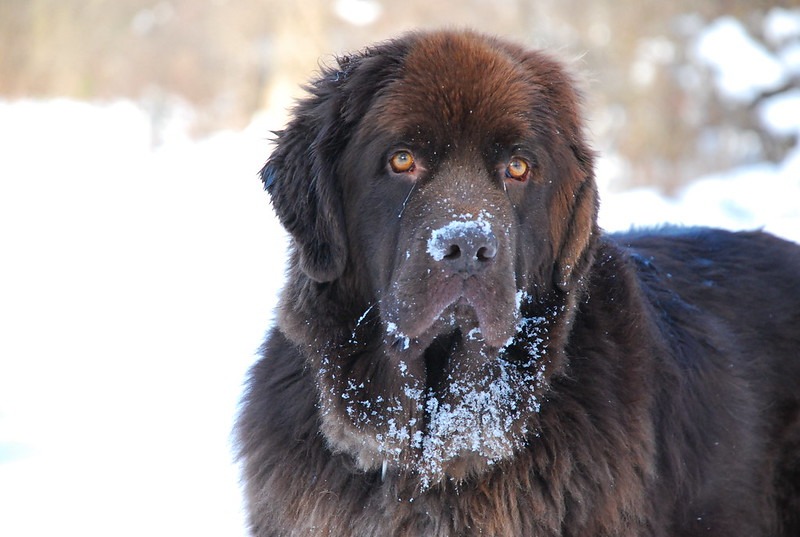
Newfoundland Dog: Gentle Giant of the Water
The Newfoundland, often referred to as a gentle giant, is a large and powerful dog breed known for its sweet temperament and impressive working abilities. This breed is highly regarded for its loyalty, intelligence, and versatility, making it a beloved companion and an invaluable working dog.
History of the Newfoundland
The history of the Newfoundland dog breed dates back to the island of Newfoundland in Canada. These dogs were originally used by fishermen to haul nets, pull carts, and rescue drowning victims. Their webbed feet, thick double coat, and strong swimming abilities made them well-suited for these tasks. The breed’s ancestry likely includes large working dogs brought to the island by European fishermen in the 17th and 18th centuries.
The Newfoundland gained recognition for its heroic water rescues, and its reputation spread worldwide. The breed was recognized by the American Kennel Club (AKC) in 1886, and it has since become a popular breed for both work and companionship.
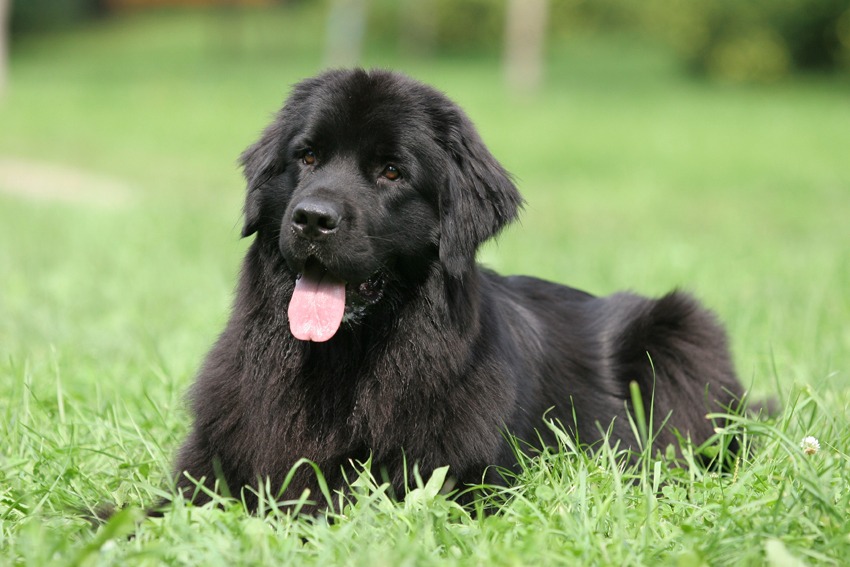
Physical Characteristics of the Newfoundland
Newfoundlands are large, robust dogs with a strong, muscular build. Males typically stand between 28 to 30 inches at the shoulder and weigh between 130 to 150 pounds, while females are slightly smaller, standing 26 to 28 inches tall and weighing between 100 to 120 pounds.
One of the most distinctive Newfoundland characteristics is their thick, water-resistant double coat, which comes in colors such as black, brown, gray, and Landseer (white with black markings). They have a broad head, deep chest, and powerful legs, making them excellent swimmers. Their eyes are dark and expressive, conveying a gentle and kind demeanor.
Temperament and Personality
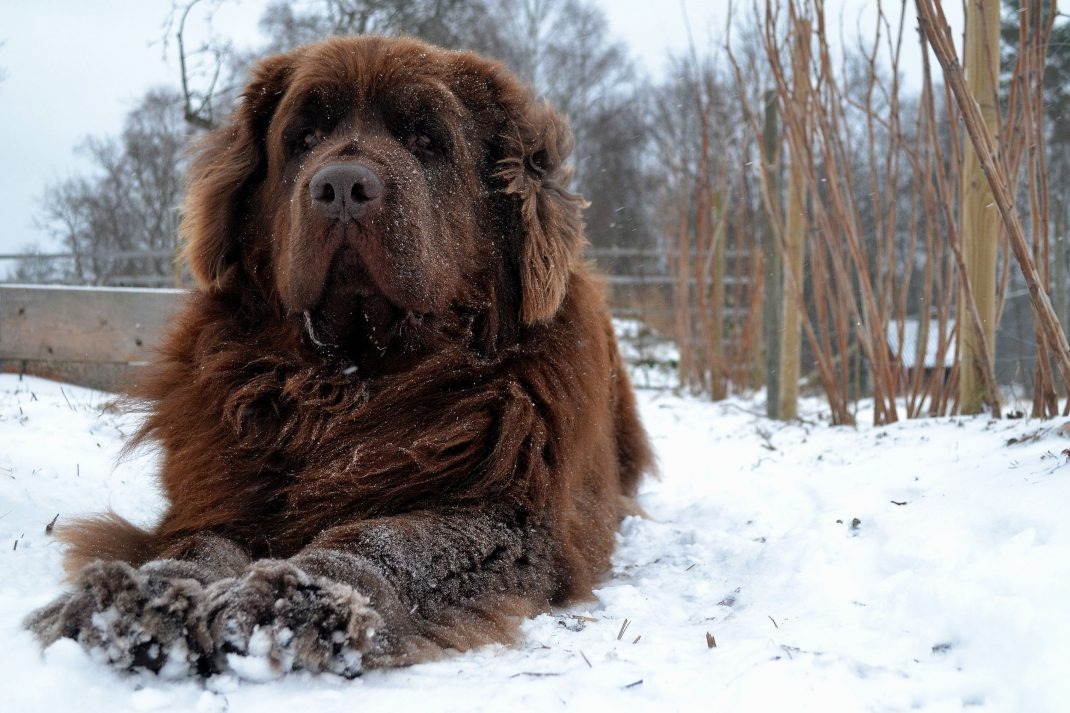
The Newfoundland temperament is often described as gentle, loyal, and patient. These dogs are known for their friendly and calm nature, making them excellent companions for families, including those with children. Newfoundlands are also highly intelligent and eager to please, which makes them relatively easy to train.
Despite their large size, Newfoundlands are typically very gentle and careful around small children and other pets. They are protective of their families and can be reserved around strangers, but they are generally not aggressive. Their calm and patient nature makes them excellent therapy dogs as well.
Health and Common Issues

Like all dog breeds, Newfoundlands are prone to certain health issues. Some of the most common Newfoundland health issues include:
- Hip Dysplasia: A genetic condition that affects the hip joints, leading to arthritis and mobility issues.
- Elbow Dysplasia: A similar condition affecting the elbow joints, causing pain and lameness.
- Cystinuria: A genetic disorder that causes the formation of bladder stones.
- Subvalvular Aortic Stenosis (SAS): A heart condition that can lead to heart failure.
- Bloat (Gastric Dilatation-Volvulus): A serious condition where the stomach twists, cutting off blood flow and causing a life-threatening situation. Immediate veterinary attention is required.
Regular veterinary check-ups, a balanced diet, and proper exercise are essential to keep Newfoundlands healthy and to manage potential health issues early on.
Care and Maintenance
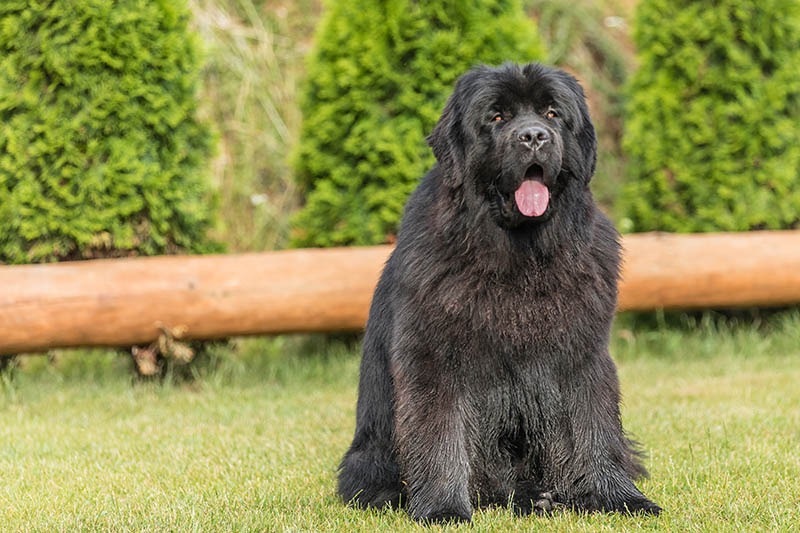
Newfoundland care involves regular grooming, exercise, and mental stimulation. Their thick double coats require frequent brushing to prevent matting and tangles. Bathing should be done as needed, typically every few months, to keep their coat clean and healthy.
Dental care is important, so brushing their teeth several times a week is recommended to prevent dental disease. Regular nail trimming and ear cleaning are also essential aspects of Newfoundland care to prevent infections and maintain overall hygiene.
Training Your Newfoundland
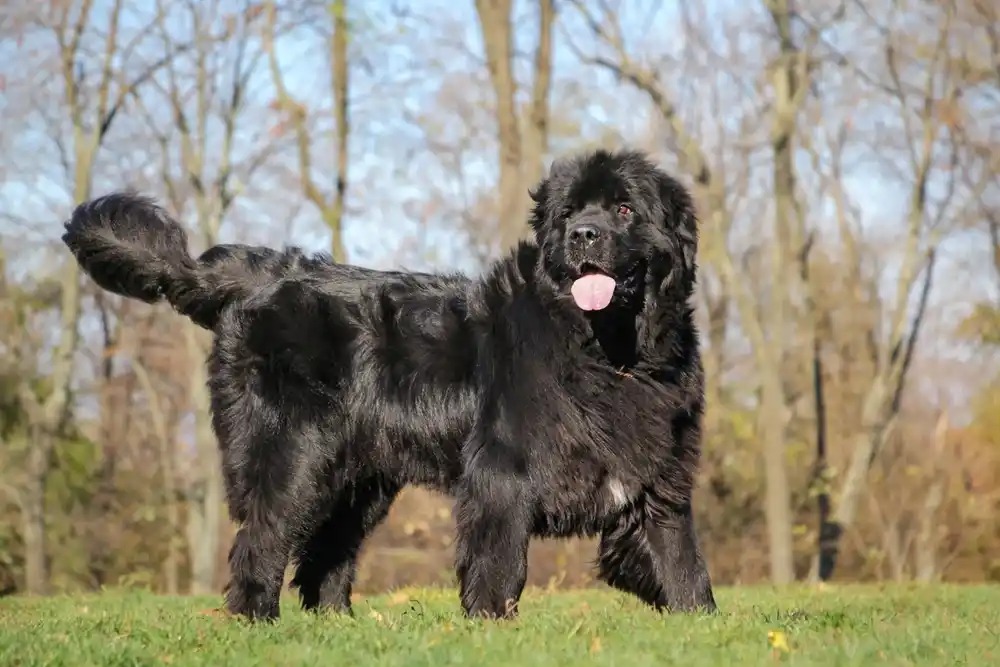
Training a Newfoundland requires consistency, patience, and positive reinforcement techniques. Due to their intelligence and eagerness to please, Newfoundlands typically excel in obedience training and can learn a wide range of commands and tasks.
Early socialization and puppy training classes are highly recommended to ensure they develop good manners and confidence. Positive reinforcement methods, such as treats, praise, and playtime, are effective in training Newfoundlands. They respond well to a calm and patient approach, making the training process enjoyable for both the dog and the owner.
Exercise Needs
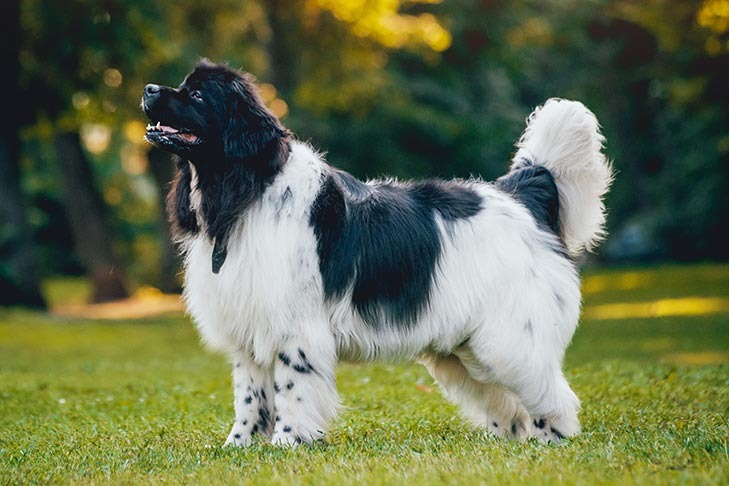
Newfoundlands have moderate exercise needs and require regular physical activity to stay happy and healthy. As a large and active breed, they thrive on activities that challenge their bodies and minds. Daily walks, swimming sessions, and playtime are essential to keep them physically fit.
Activities such as water rescue training, obedience exercises, and hiking are excellent ways to keep a Newfoundland engaged and mentally stimulated. Without sufficient exercise, Newfoundlands can become bored and may develop behavioral issues such as chewing or digging.
Newfoundland Puppies: What to Expect
Bringing home a Newfoundland puppy is an exciting and rewarding experience. Newfoundland puppies are known for their playful and curious nature. It’s important to provide them with a safe and stimulating environment to explore and learn.
Early socialization is crucial, exposing them to different people, environments, and other animals to help them grow into well-adjusted adults. Puppy-proofing your home and providing plenty of chew toys can prevent destructive behavior during the teething phase.

Feeding Newfoundlands: Puppy, Adult, and Senior Diets
Proper nutrition is vital for the health and development of Newfoundlands at every stage of life.
- Puppies: Newfoundland puppies require a diet rich in protein and fat to support their rapid growth and energy needs. High-quality puppy food that meets their nutritional requirements is essential. Look for formulas with real meat as the first ingredient and avoid fillers like corn and soy.
- Adults: Adult Newfoundlands benefit from a balanced diet that provides the right amount of protein, fat, and carbohydrates. It’s important to monitor their weight and adjust their food intake based on their activity level to prevent obesity. High-quality dry kibble, supplemented with lean meats, vegetables, and grains, can ensure they get the nutrients they need.
- Seniors: Senior Newfoundlands may require a diet lower in calories but still rich in nutrients to support their aging bodies. Foods formulated for senior dogs often contain joint supplements like glucosamine and chondroitin to help maintain mobility. Additionally, easily digestible proteins and fibers can promote healthy digestion.
Behavior with Children and Other Dog Breeds
Newfoundlands are generally excellent with children and make wonderful family pets. Their gentle and patient nature makes them great companions for kids of all ages. However, it’s important to supervise interactions, especially with younger children, to ensure safety for both the dog and the child.

With other dogs, Newfoundlands are typically sociable and enjoy companionship. They get along well with other pets and can thrive in multi-pet households. Early socialization and training can help promote harmonious relationships with other animals and prevent any potential dominance issues.
Ideal Environment for Their Development
Newfoundlands thrive in environments where they can get plenty of exercise and mental stimulation. They are adaptable dogs and can do well in both urban and rural settings, provided they receive adequate physical activity. Homes with large, fenced yards where they can run and play freely are ideal for this breed.
Newfoundlands do not do well when left alone for long periods, as they can develop separation anxiety. They thrive in households where someone is often home or where they can be included in family activities. A stimulating and active environment is key to keeping a Newfoundland happy and healthy.
Breed Standards According to the AKC
According to the American Kennel Club (AKC), the breed standard for Newfoundlands emphasizes a well-balanced, powerful, and agile dog with a gentle and dignified demeanor. They should have a thick, water-resistant double coat, a broad head, and strong, muscular legs that contribute to their impressive swimming abilities.
The Best Role for the Newfoundland
The Newfoundland is best suited for roles that leverage its strength, swimming abilities, and gentle nature. Historically, Newfoundlands were used for water rescues and hauling heavy loads for fishermen. Today, they excel in water rescue operations, therapy work, and as family companions.
Their natural instincts and physical abilities make them particularly well-suited for water rescue tasks, where their strength and swimming capabilities can be utilized to save lives. Additionally, their calm and patient nature makes them excellent therapy dogs, providing comfort and companionship to those in need.
By understanding the unique characteristics, needs, and care requirements of the Newfoundland dog breed, potential owners can provide the best possible life for these gentle giants. Integrating thorough research ensures that the Newfoundland remains a cherished and well-cared-for companion.
Frequently Asked Questions
Are Newfoundlands good swimmers?
Yes, Newfoundlands are excellent swimmers with a natural affinity for water. They have webbed feet and a thick, water-resistant coat that enables them to navigate through water with ease, making them ideal companions for water activities and rescue work.
Are Newfoundlands good with children?
Yes, Newfoundlands are known for their gentle and patient nature, especially with children. They are affectionate and protective companions that enjoy being around kids and make excellent family pets.
Do Newfoundlands drool a lot?
Newfoundlands may drool occasionally, especially after eating or drinking. While some individuals may drool more than others, it’s essential to keep a drool rag handy to wipe their mouth and prevent drool from getting on furniture and floors.
Are Newfoundlands prone to heatstroke?
Due to their thick double coat and large size, Newfoundlands are susceptible to heatstroke in hot weather. It’s essential to provide them with plenty of shade, fresh water, and access to cool indoor areas during hot days to prevent overheating.
Do Newfoundlands require a lot of exercise?
Despite their size, Newfoundlands have moderate exercise needs and enjoy daily walks, swimming sessions, and playtime. They are adaptable dogs that can adjust their activity level to their owner’s lifestyle but still require regular physical and mental stimulation to stay healthy and happy.
Are Newfoundlands good guard dogs?
Newfoundlands are naturally protective of their families and make excellent watchdogs due to their size and deep bark. While they are not aggressive, their mere presence is often enough to deter potential intruders.
Do Newfoundlands shed a lot?
Newfoundlands have a thick double coat that sheds moderately year-round, with heavier shedding occurring during seasonal changes. Regular grooming, including brushing their coat several times a week, helps to remove loose hair and minimize shedding.
Are Newfoundlands prone to separation anxiety?
Newfoundlands are social animals that form strong bonds with their families. While they may experience some degree of separation anxiety when left alone for long periods, early training and gradual desensitization can help prevent and manage separation anxiety behaviors.
Are Newfoundlands good apartment dogs?
While Newfoundlands can adapt to apartment living, they require ample space and regular outdoor exercise to meet their needs adequately. Access to a securely fenced yard or nearby parks for exercise and play is essential for their well-being.
Do Newfoundlands get along with other pets?
With proper socialization, Newfoundlands can get along well with other pets, including dogs and cats. Early introductions and positive interactions are essential for fostering good relationships between Newfoundlands and other animals in the household.
